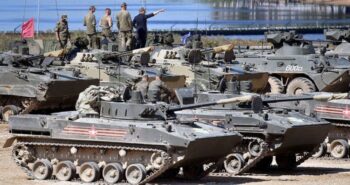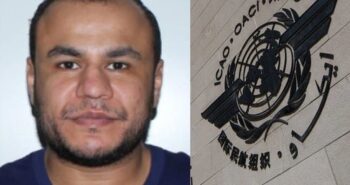By Inga Kristina Trauthig
 By tracing and explaining the history of the LMB ’s organisational developments, this report examined one way in which the LMB tried to establish itself as a legitimate political actor with regard to Islam in the Libyan political sphere after 2011.
By tracing and explaining the history of the LMB ’s organisational developments, this report examined one way in which the LMB tried to establish itself as a legitimate political actor with regard to Islam in the Libyan political sphere after 2011.
(The full report can be accessed here).
PART SIX
Lack of an Ideologically Opposed Political Party Impedes the LMB’s Political Advances
To make things worse for the LMB, the NFA was not what in the West would be considered a secular party, but rather a conglomerate of individuals located across the political spectrum, from liberal to Islamist.
This made it even trickier for the LMB to differentiate itself and build authentic Islamic credentials by contrasting itself with a secular opponent.
In other words, there was no “other” the LMB could have defined itself against; this problem significantly hindered the formation of its religious identity, a juxtaposition of “us” (the Muslim identity) versus “them” (the secularists).
Instead, the NFA was a newly founded party, led by former interim prime minister Mahmoud Jibril, that included a wide array of civil society organisations, smaller parties and individuals who identified as non-Islamist but also some who identified as Islamists.
In addition, it advocated for Sharia to be considered a “main source of legislation”, acknowledging the uncontentious necessity to appeal to the conservative Libyan people. Hence, while the NFA portrayed itself to the international audience as the secular alternative to the LMB and other Islamist parties, it never did so domestically.
Since secularism enjoys little support outside an elite group of former exiles. As a final point, the LMB not only found itself attacked on its Islamist agenda by the NFA but outflanked by other Islamist parties such as the Watan Party and non-party opposition groups as well.
This meant that the LMB did not really offer anything concrete or practical regarding its political vision apart from establishing Sharia as the main source of legislation; this, however, did not distinguish it from other political parties and they were never seen as particularly trustworthy on the issue. Thus, in Libya they could not capitalise on their core claim of being a true bearer of Islam.
Negligible Presence in Mosques – no Islamic Credentials Originating from this Institution
One factor that could have changed the game for the LMB was if they had been able to establish a social network and presence in the mosques before competing in elections. Since the LMB had been heavily oppressed by Qaddafi and, after the deal brokered with Saif Al-Qaddafi, failed to roll out its organisation in the country, even after the revolution it did not have a network either of charities or in mosques that it could build on.
Instead, it was the Salafis who gained the most from mosques. It is clear that the “most effective platform in Libya” – the mosques – were not sufficiently accessed by the LMB.
One can speculate that if they had “gotten the mosques, the speech of the Friday prayers, they would not have needed Al-Jazeera, not Al-Arabiya or Sky News”, but instead would have had the most credible and natural access to the Libyan people and could have changed their perception in the country significantly.
However, this paper will not try to prove something that never happened. To sum up, the LMB’s central attempt to represent itself as the true bearer of Islam (Islam’s vanguard) mattered little in a country where basically all political organisations paid lip service to Islam and thus there was no political force the LMB could effectively position itself against.
While in neighbouring countries the MB could style itself as the vanguard of Islam, the LMB had no comparable role to play. In short, the LMB was not able to claim a monopoly over Islam in the political sphere and present itself as a party with legitimate claim to act as the true bearer of Islam in Libyan politics.
Conclusion
By tracing and explaining the history of the LMB’s organisational developments, this paper examined one way in which the LMB tried to establish itself as a legitimate political actor with regard to Islam in the Libyan political sphere after 2011.
Almost paradoxically, even though Libya is a majority Sunni country with a conservative society, that did not translate into a conservative Sunni movement like the MB proving as popular as many had anticipated, derailing the impression that the whole region was “going Islamist” after 2011.
To this end, the paper has outlined relevant aspects that thwarted the LMB’s potential success story in the country: its inability to leave behind the demons of the past and establish credibility in its key source for legitimacy in contemporary Libya, Islam (alongside outlining a distinctly Libyan contribution to the debate on how political actors might derive legitimacy).
The LMB today is still haunted by ghosts of the past, such as the decades-long demonisation by the Qaddafi regime, its exiled organisational structure and related impotence in developing a strong social base.
The LMB was quick to blame these factors – exacerbated by their opponents’ fearmongering of a purported Islamist takeover – as responsible for the JCP’s poor showing in the 2012 election, neglecting self-inflicted wounds such as the Islamists’ inability to unite or to win over major parts of the population with their political programme.
Following the 2012 election, however, the LMB successfully crept into the centre of political decision-making and proved the most muscular force in pushing for the draconian political isolation law, which targeted the exclusion of some of its most potent rivals (particularly in the NFA).
Overall, the LMB exhibits a zero-sum approach to politics rather than bridging divides and pursuing compromises. Of course, the LMB, like other political forces in Libya, is hostage to military developments in the country, having to operate in a colossally demanding environment with the country sorely fragmented and political forces incapable of controlling the battleground.
Despite its logistical support and affiliation with some militias, as well as its members joining various armed groups in individual capacities, the MB never established its own military wing with overtly branded MB militias.
Thus, after installing itself in the political power apparatus, the LMB had no military forces under its leadership that it could indiscriminately rely upon when trying to enforce security. In hindsight it can be said that the perceived unwillingness to protect the Libyan population (it was seen as ruling after 2012) negatively influenced the perception of the LMB as a ruling entity in the country.
Generally speaking, the militarisation of the revolution meant that from the early days onwards, armed groups influenced political decisions. Again, LMB members were leading actors in this development, such as, for example, the deputy of the Misratan interior Omar al‑Khadrawi, who is a Brother from Zawiya.
To sum up, it was obvious that the LMB was interlinked with militias in the country, but simultaneously this involvement was messy and opaque, which led to criticism and speculation among Libyans that ultimately hurt the LMB instead of credibly promoting its commitment to the revolution and its ideals in military terms.
As a result, the LMB is one of many political forces that was reduced to negligible importance and simply struggling against other political forces for relevance and recognition.
On top of that, in this struggle, the LMB underperformed in the key aspect that would have helped it to earn legitimacy and establish it as a credible political actor in post‑Qaddafi Libya.
Despite it being part of an established transnational Islamist movement, the LMB failed to persuade Libyans that it is a “true bearer of Islam”, whereas the MB had success with its unique selling point in neighbouring countries where it could juxtapose itself with liberal forces and advocate most authentically for a Sharia-based political system.
This paper does not predict the future for the LMB or the JCP, but it can draw conclusions based on existing opinions of the LMB in the country, burdens from the past still influencing perceptions of the LMB and recent political schemes that have shaped its image.
Overall, the LMB exhibited a more hawkish and less compromise-oriented policy approach than its Tunisian counterpart and, while aiming to grow in importance in the Libyan political sphere, cooperated with some of the more radical Islamist groups.
However, recently it moderated some of its stances by verbally backing the LPA and simultaneously seemingly trying to appeal to its fiercest opponents like Haftar – for example by referring to the LNA fighters that died in recent battles as “martyrs”.
From a social perspective, it remains to be seen if the LMB will continue and succeed in building up a social network resembling what it achieved in Egypt over the last decades; this could in the long-term strengthen its presence in the country and help it to mobilise and profit politically.
However, as outlined above, a plethora of other Islamist groups developed a presence in Libya outflanking the LMB, for example with regard to holding the prestigious Friday sermons in mosques.
As a consequence of its limited social reach, holding on to power positions in Libya, as well as Libya’s vast oil resources to bankroll activities in the region, is crucial for the LMB’s survival.
Yet the power structure of Libya is currently divided and its future configuration uncertain because of its dependence on military developments nationally and diplomatic developments internationally.
Finally, the LMB’s unpopularity (already in evidence in 2012, but aggravated over the course of 2013 and 2014) led some Libyans to the conclusion that they cannot have a bright future: the people don’t like them and at some point, will revolt against them.
The Muslim Brotherhood has done a lot in the last years and the people remember that. They are corrupted. They took advantage of power.
Even if the Libyan people do not revolt against the LMB, this sentiment does not bode well for a movement that currently operates in a semi-democratic system where elections might be the next challenge for it to ensure its survival in the political landscape.
Still, the LMB is definitely a power to reckon with in the future as it has established itself in local councils, is affiliated with some armed forces and is currently securely entrenched in the power structures in the west of the country. But it will always be restricted by other forces, such as tribalism and the newly emergent local power centres, which will work as constraining influences.
Libya is no exception in a region of authoritarian systems that killed off political culture and nurtured an approach of zero-sum politics.
Therefore, the LMB must also be seen as an outgrowth of Libya’s preconditions before 2011, and the political forces to its left and right would probably be judged similarly harshly in a comparison along the same lines, signalling not necessarily the failings of political Islam but also “the tragedy of a region unable to translate its own revolutions into a better, more confident future”.
The outcome is a growing public conviction that Libya might be better off without political parties.
Final Remarks
The complexity of the Libyan situation means that many aspects could not be discussed in detail here. Excellent analyses on the most salient ones can be found in the following bibliography, including on the tribal and geographical implications behind local identities and regional dynamics in Libya’s political sphere, in the writings of Haley Cook and Jason Pack as well as Wolfram Lacher; on voting diversion according to local differences, for example in Omar Ashour, Project Syndicate; on the “rejectionist” sentiment in Libya regarding politics in general, in Amir Kamel’s chapter
***
Inga Kristina Trauthig is a Research Fellow at ICSR and a PhD candidate at the War Studies Department at King’s College London. Her research focusses on the changing Islamist landscape in post-Qaddafi Libya and aims to explore the political influence of dominant Islamist and Salafi groups in the country.Inga is an Associate Fellow at the Institute for Strategic Dialogue, Member of the Standing Expert Committee Terrorism and Interior Security of the Konrad-Adenauer- Foundation, part of the extended board of Women and International Security in Germany and Fellow of the Atlantic Initiative.
___________





